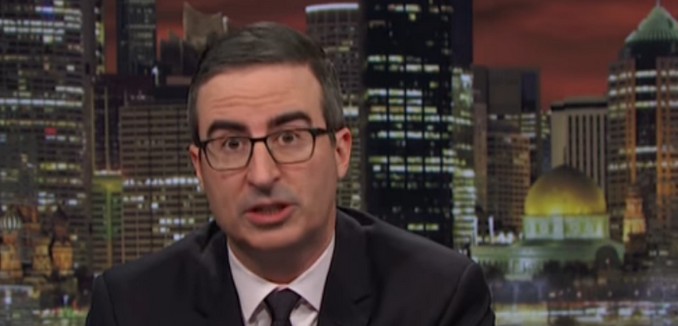On Sunday’s Last Week Tonight, John Oliver gave a passionate defense of the nuclear deal with Iran. The Israel Project identified Oliver’s main arguments in favor of the JCPOA and explained the shortcomings in his analysis. The Israel Project maintains that the major flaws of the agreement must be fixed: the sunset clauses, ballistic missiles, research and development on advanced centrifuges, verification mechanisms, and the sanctions windfall from the JCPOA.
Myth 1
Minute 5:55 Oliver suggests that “Iran’s President Rouhani is relatively moderate.”
Wrong: Rouhani is not a moderate. He’s just a less extreme extremist. First, Rouhani was only elected because the ayatollah establishment put him on the ballot – the real moderates were disqualified before the election took place. Second, the human rights situation in the country has deteriorated under his reign. According to an investigation by the U.N.’s Special Rapporteur for Human Rights in Iran, at least 966 people were put to death in the country in 2015—the highest number since 1989, twice as many as in 2010, and 10 times as many as in 2005.
Myth 2
6:04 Oliver is citing a tweet from Rouhani in which he wishes “all Jews” a Happy Rosh Hashana as a sign of his moderation.
Wrong: The accusation of having real or perceived ties to Israel is a powerful tool of oppression in the Islamic Republic and is frequently levelled against the country’s few remaining Jews. The regime denies the Holocaust and regularly calls for the elimination of the state of Israel. State-owned publications publish anti-Semitic cartoons that depict Jews as demonic and malevolent creatures.
Myth 3
7:53 Oliver asked: “What did we get out of the deal, the answer is quite a lot.”
Wrong: The JCPOA does not permanently prohibit Iran from obtaining a nuclear weapon. To the contrary, it equips the Iranians with a patient pathway to achieve its goal. The regime in Tehran knows that by following the terms of the JCPOA, Iran will emerge as a nuclear threshold state with an industrial-size enrichment program and close to zero-breakout time in little more than a decade.
Myth 4
8:48 Oliver claims that the deal has strict “verification mechanisms to ensure they’re in compliance.”
Wrong: IAEA Director General Yukiya Amano confirmed that the nuclear watchdog has been unable to verify that Iran is implementing Section T of the nuclear agreement, based on Iran’s refusal to provide adequate information and access. Effectively, it means that we can’t be sure that they are not designing a bomb, the crux of the nuclear agreement.
Myth 5
11:54 Oliver charges that “the deal allows for regular monitoring at all declared nuclear sites.”
Wrong: The verification procedures to ensure Iran’s compliance are not nearly as airtight as Oliver claims. Iran can hold international inspectors at arm’s length for at least 24 days, and likely even for a period of three months or longer before some of the nuclear sites can be inspected. This would allow Iran to clean up sites where the country engages in weaponized activities. Experts also warn that “Tehran may only need two days to remove nuclear equipment from a small facility and remove any traces of uranium, which even environmental sampling may be unable to detect.” In addition Iran has declared that military sites, where Iran has previously done nuclear weapons research, are off-limits to IAEA inspectors.
Myth 6
12:17 Oliver suggests that Iran is in compliance because the IAEA didn’t find breaches of the agreement.
Wrong: First, that’s not relevant for certification: condition 1 of Corker-Cardin requires the president to certify Iran has implemented all parts of the agreement, not that Iran hasn’t been caught cheating on the parts they have implemented. Second, the IAEA hasn’t caught Iran cheating because they haven’t been able to look where Iran is cheating.
Myth 7
14:00 Oliver charges that the deal is a good deal because without it Iran could start building a bomb now.
Wrong: Oliver inadvertently admitted that the deal is not living up to what it promised. He acknowledges that Iran can sit out the terms of the agreement and re-launch its nuclear program. Yet President Obama said in a speech at the American University in Washington D.C. in August 2015:
“After two years of negotiations, we have achieved a detailed arrangement that permanently prohibits Iran from obtaining a nuclear weapon. It cuts off all of Iran’s pathways to a bomb. It contains the most comprehensive inspection and verification regime ever negotiated to monitor a nuclear program.”
[Photo: LastWeekTonight / YouTube]




